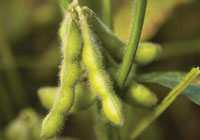SoyBeans
..........Soybean Story Follow the Soy-Backed Road
 With petroleum prices historically unstable, industry leaders are continually working to find new ways to replace petroleum in their products with renewable resources such as natural oils. One use for domestically grown soybeans brings soy from the field to the floor. Universal Textile Technologies (UTT) has developed BioCelTM and EnviroCelTM plant based carpet backings for use in commercial and residential environments and for synthetic turf.
With petroleum prices historically unstable, industry leaders are continually working to find new ways to replace petroleum in their products with renewable resources such as natural oils. One use for domestically grown soybeans brings soy from the field to the floor. Universal Textile Technologies (UTT) has developed BioCelTM and EnviroCelTM plant based carpet backings for use in commercial and residential environments and for synthetic turf.
UTT has worked to incorporate plant-based polymers into synthetic turf and carpet backing technology since 1999. Plant-based polymers are polyurethane polymers manufactured with a portion of the polyol derived from renewable resources such as the soybean plant. UTT uses natural oil which is extracted from soybeans, stabilized by removing gums and waxes, and converted into a polymer. This polymer becomes an integral part of the synthetic turf and carpet backing and helps lock the turf and carpet fibers into place.
BioCelTM is manufactured for use in high-traffic carpet applications and synthetic turf, EnviroCelTM for mid-range traffic applications, synthetic turf, and residential carpets.
The plant based polyols are incorporated into petroleum based polyols, creating performance based polyurethane. This contributes to the American economy as well as the environment, by incorporating a renewable resource and reducing the petroleum content. UTT enjoys the benefit of American grown soybeans which provides more consistent pricing as opposed to ever-changing petroleum prices.
U.S. Soybean Board Study Shows Consumer Interest Strong in Biobased Products
The United Soybean Board (USB) is a commodity checkoff program that oversees investments in areas including technology and innovation on behalf of the over 600,000 U.S. soy farmers. The USB released the findings of a landmark public opinion study that shows American consumers’ knowledge of biobased products is a strong interest and growing. The nationwide research conducted by NuStats for USB also found that the public looks to the federal government to educate consumers, promote bio-based products through education and funding as well as lead by example as a purchaser of the these products. A wide range of biobased products such as cleaning supplies, lubricants, foam insulation, BioCelTM and EnviroCelTM carpet and synthetic turf backings are currently available. Soybean oil and other renewable agricultural materials serve as an ingredient in the products and reduce the petroleum content in them. Eight out of ten (81%) of those surveyed with modest knowledge already expressed interest in learning more about them. Overall, 63% of those surveyed were interested in biobased products or learning more. Research affirms that Americans see the value of biobased products, which can be made from America’s own soybeans to offer energy security, environmental worker health and other benefits. Through their checkoff, soybean growers have helped research and bring many of these products to market as well as helped educate federal employees about them.
The Farm Bill called for the federal government to purchase biobased products. The USB has produced a catalog of currently available soy biobased products as well as profiles of success in federal biobased products use, which are available on the USB website. The USB is composed of 64 U.S. soybean farmers appointed by the Secretary of Agriculture to invest soybean checkoff funds. The soybean checkoff is a farmer supported marketing and research fund collected on each bushel of U.S. soybeans sold. USB invests these funds on behalf of the 680,000 U.S. soybean farmers in activities specifically designed to increase the global utilization of U.S. soybeans and to reduce production costs. Checkoff-funded investment areas include human and animal health and nutrition, research and development of new uses, and research to improve soybean composition and production efficiencies.
For additional information on research and documentation on biobased technology, visit the US Soybean Board at www.soybiobased.org.
